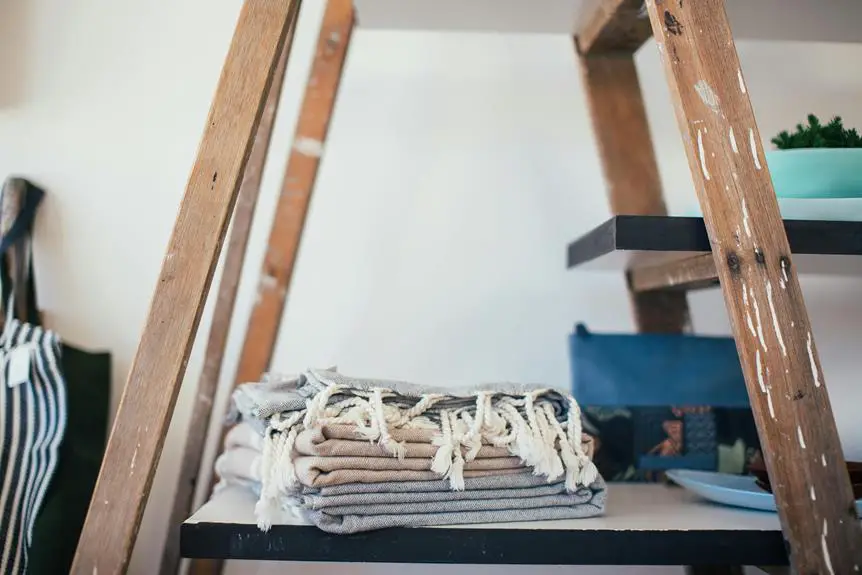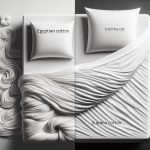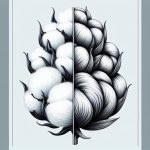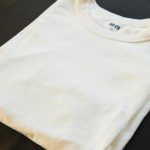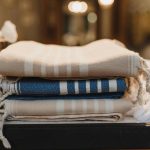When you think about luxury fabrics, Supima cotton and Egyptian cotton often come to mind. Each has its own unique qualities, but how do they really stack up against one another? While Supima is known for its exceptional softness and durability, Egyptian cotton carries a rich heritage that some consumers value. Yet, inconsistency in quality might raise some questions. As you weigh the options, consider what truly matters to you in terms of comfort and longevity—your choice might not be as straightforward as it seems.
Table of Contents
Origins of Supima Cotton
Supima cotton, which is often regarded as one of the finest cotton varieties, primarily originates from the United States. Developed in the 1950s, it's a trademarked brand of American-grown Pima cotton. This luxurious fiber comes from the long-staple cotton plants, specifically bred for their superior quality. You'll find Supima cotton primarily cultivated in California, Arizona, New Mexico, and Texas, where the ideal climate and soil conditions contribute to its exceptional characteristics.
When you choose Supima cotton, you're opting for a product that's not only soft and durable but also resistant to fading and fraying. The manufacturing process emphasizes sustainability, with growers practicing eco-friendly farming techniques. Each Supima cotton fiber is longer and stronger than standard cotton, giving it a silky feel that's hard to match.
Moreover, Supima cotton is known for its vibrant colors, which remain bright even after multiple washes. As a result, it's a popular choice for luxury bedding, clothing, and home textiles. With Supima, you're investing in quality that stands the test of time, making it a worthy addition to your wardrobe or home décor.
Origins of Egyptian Cotton
Egyptian cotton, renowned for its luxurious feel and strength, traces its roots back to ancient Egypt, where it was first cultivated along the fertile banks of the Nile River. This region provided the perfect climate and conditions for growing cotton, allowing it to flourish. As you explore its history, you'll discover that Egyptian cotton has been prized for thousands of years, largely due to its long fibers that contribute to its exceptional softness and durability.
Here's a brief overview of key historical aspects of Egyptian cotton:
| Aspect | Details |
|---|---|
| Cultivation Era | Ancient Egypt, around 3000 BC |
| Key Regions | Nile Delta, Upper Egypt |
| Cultural Significance | Used in clothing, burial wraps |
| Modern Production | Primarily in Egypt, Sudan, and the USA |
The legacy of Egyptian cotton continues today, with farmers employing traditional methods alongside modern techniques to maintain its quality. When you choose Egyptian cotton products, you're not just selecting fabric; you're embracing a rich history that spans millennia.
Manufacturing Processes Compared
When comparing Supima and Egyptian cotton, it's essential to examine their manufacturing processes.
You'll want to consider how cultivation techniques, fiber processing methods, and quality control standards differ between the two.
Understanding these points will help you appreciate the unique qualities each type of cotton brings to the table.
Cultivation Techniques Overview
Cotton cultivation varies significantly between regions, impacting the quality and characteristics of the final product.
In the United States, Supima cotton is grown primarily in California, where the climate is ideal for producing long-staple fibers. Farmers utilize advanced irrigation techniques and sustainable practices, ensuring optimal growth while conserving water. This attention to detail leads to a softer, stronger cotton that's highly sought after.
On the other hand, Egyptian cotton thrives in the fertile Nile Delta. The warm, sunny climate combined with rich soil creates perfect conditions for growing long, silky fibers. Egyptian farmers often rely on traditional cultivation methods, which can include manual harvesting. This labor-intensive approach, while less efficient, is believed to enhance the cotton's quality, as it minimizes damage to the fibers.
Both cultivation techniques reflect their respective regions' agricultural practices and environmental factors. You'll find that Supima cotton emphasizes innovation and sustainability, while Egyptian cotton leans into tradition and natural advantages.
Each method contributes to the unique properties of the cotton, ultimately influencing your choice when selecting between these two luxurious materials.
Fiber Processing Methods
Two distinct fiber processing methods set Supima cotton and Egyptian cotton apart, influencing their texture and durability. Supima cotton undergoes a meticulous process that emphasizes quality at every step. This rigorous approach ensures that you get a soft, luxurious feel, along with superior strength.
On the other hand, Egyptian cotton's processing is also refined, focusing on enhancing its long fibers, but it varies in technique from Supima.
Here's a quick comparison of their processing methods:
- Supima Cotton: Uses a combing process that removes shorter fibers, resulting in a more uniform and smoother yarn.
- Egyptian Cotton: Often employs a carding method that may retain shorter fibers, leading to a coarser texture.
These differences impact not just how each fabric feels against your skin but also how well it holds up over time.
When choosing between the two, consider how these processing methods align with your preferences for comfort and longevity.
Quality Control Standards
Quality control standards play a crucial role in distinguishing Supima cotton from Egyptian cotton, ensuring that each type meets specific requirements for durability and comfort.
Supima, a premium cotton brand, adheres to strict guidelines set by the Supima Association. These standards focus on the fiber's length, strength, and color, guaranteeing you receive only the best quality. Each batch undergoes rigorous testing to ensure it meets these benchmarks, so you can trust that your Supima cotton products are consistently luxurious.
On the other hand, Egyptian cotton, while also high-quality, doesn't have a unified standard like Supima. Different manufacturers may apply varying quality control measures, leading to inconsistencies. Some brands may promote their Egyptian cotton as superior, but without strict oversight, it can be challenging to determine its true quality.
When you choose Supima cotton, you're opting for a product that has undergone comprehensive quality testing, ensuring it stands out in terms of softness and durability.
In contrast, with Egyptian cotton, you might end up with varying quality, depending on the manufacturer. Knowing this can help you make a more informed choice based on your preferences and expectations for quality.
Softness and Comfort
When you touch Supima cotton, you immediately notice its luxurious softness, which rivals that of Egyptian cotton. This unique fabric feels incredibly gentle against your skin, making it an ideal choice for those who value comfort in their bedding and clothing. You'll appreciate how both types of cotton provide a cozy experience, but Supima often edges ahead due to its longer fibers that create a smoother surface.
Here are a few reasons why Supima cotton excels in softness and comfort:
- Silky Texture: The long fibers of Supima give it a silky feel that enhances the drape, making it a pleasure to wear or sleep on.
- Breathability: It allows air to circulate, keeping you cool and comfortable, especially in warmer climates.
In comparison, Egyptian cotton also offers a soft touch, but you'll find that Supima tends to provide an even softer and more luxurious experience overall. Whether you're wrapping yourself in sheets or donning a shirt, the comfort is undeniable.
Durability and Longevity
Durability is one of Supima cotton's standout features, often outlasting Egyptian cotton due to its stronger, longer fibers. When you choose Supima, you're investing in a fabric that can withstand the test of time, making it ideal for everyday use. Its robustness means it resists fraying and fading, ensuring that your items maintain their fresh look through countless washes.
On the other hand, while Egyptian cotton is also known for its quality, its shorter fibers make it slightly more prone to wear and tear over time. You might notice that Egyptian cotton can lose its luster and softness after extensive use, especially if it's not cared for properly.
If you're looking for bedding or clothing that will stand up to frequent washing and maintain its appearance, Supima cotton is the way to go. Its durability not only enhances its longevity but also delivers a consistent, reliable performance.
Price and Value Analysis
Supima cotton typically comes at a higher price point than Egyptian cotton, but its exceptional value lies in its superior quality and longevity. When you invest in Supima, you're not just paying for fabric; you're choosing a product that offers benefits that often outweigh the initial cost.
Consider the following when weighing your options:
- Durability: Supima cotton is known for its strength and resistance to fraying and fading, meaning it lasts longer.
- Softness: The long fibers of Supima provide a luxuriously soft feel, often more comfortable than Egyptian cotton.
While Egyptian cotton is more affordable, it may not offer the same level of performance or durability. If you're looking for bedding or clothing that stands the test of time, the extra expense for Supima cotton can be justified.
Ultimately, the choice boils down to how much value you place on quality and longevity versus initial cost. Investing in Supima cotton means you'll enjoy a premium product that enhances your everyday life.
Frequently Asked Questions
Can Supima Cotton Be Blended With Other Fabrics?
Yes, you can blend Supima cotton with other fabrics like modal, polyester, or spandex. This blend enhances durability, stretch, and comfort, making it versatile for various applications in clothing and home textiles.
What Are the Environmental Impacts of Growing Egyptian Cotton?
Growing Egyptian cotton can lead to water overuse, soil depletion, and pesticide reliance, impacting local ecosystems. You should consider sustainable practices and organic options to minimize environmental harm while enjoying the benefits of this luxurious fabric.
How Do I Care for Supima Cotton Products?
To care for Supima cotton products, wash them in cold water with a gentle detergent, avoid bleach, and tumble dry on low. Iron on a medium setting for best results, keeping them looking great longer.
Are There Any Certifications for Egyptian Cotton?
Yes, there are certifications for Egyptian cotton. Look for the Cotton Egypt Association's seal, which ensures authenticity and quality. This certification guarantees that the cotton meets specific standards, so you're getting genuine Egyptian cotton products.
Which Is Better for Sensitive Skin: Supima or Egyptian Cotton?
If you have sensitive skin, you'll likely find Supima cotton to be gentler. Its long fibers create a smoother fabric, reducing irritation compared to Egyptian cotton, which can sometimes be harsher due to its texture.
- Tetron Fabric for Marine Applications: Durability and Use Cases - June 18, 2025
- Tetron Fabric for Outdoor Furniture: Weather Resistance and Care - June 18, 2025
- Tetron Fabric for Wall Coverings: Style and Application Tips - June 18, 2025

